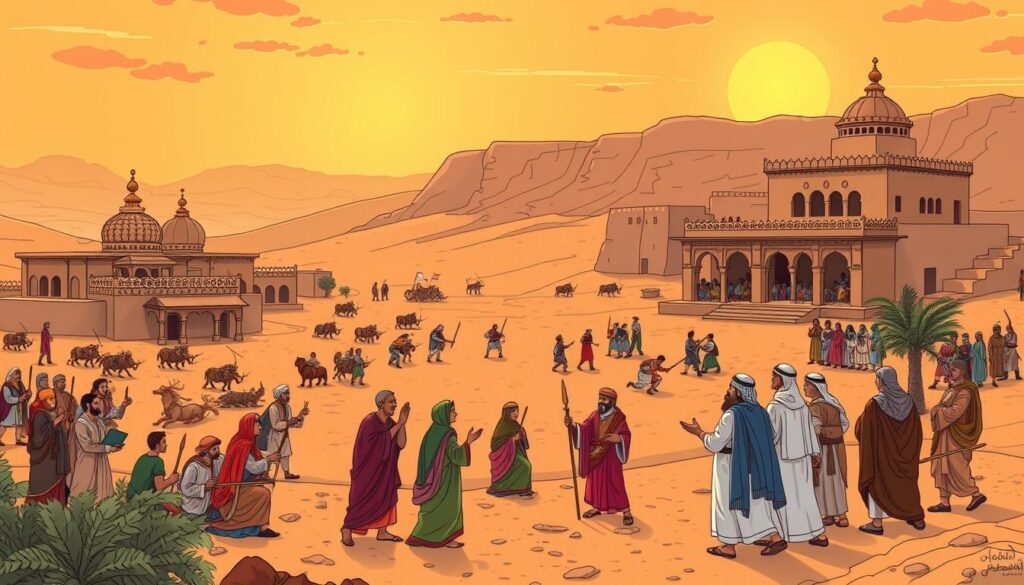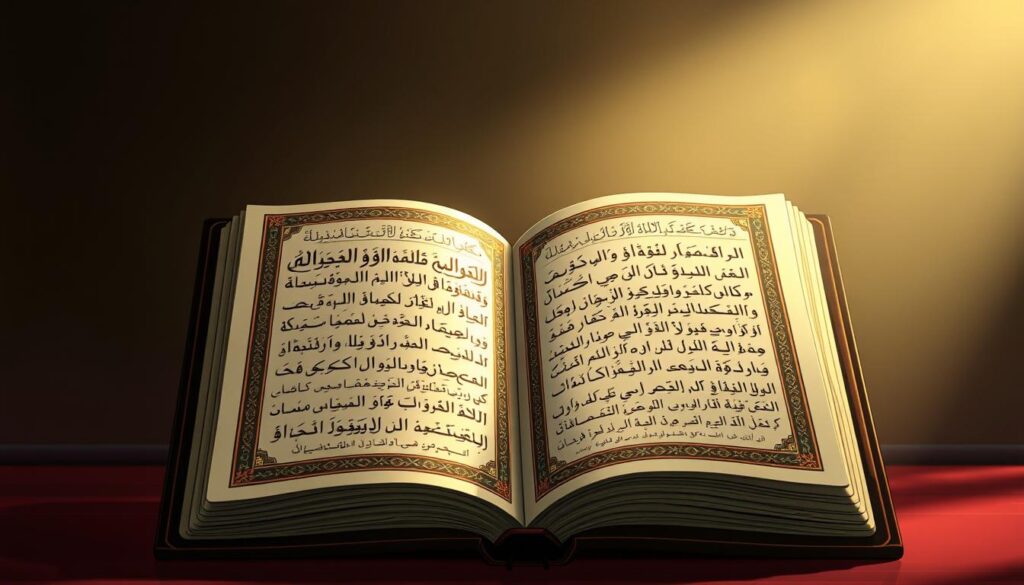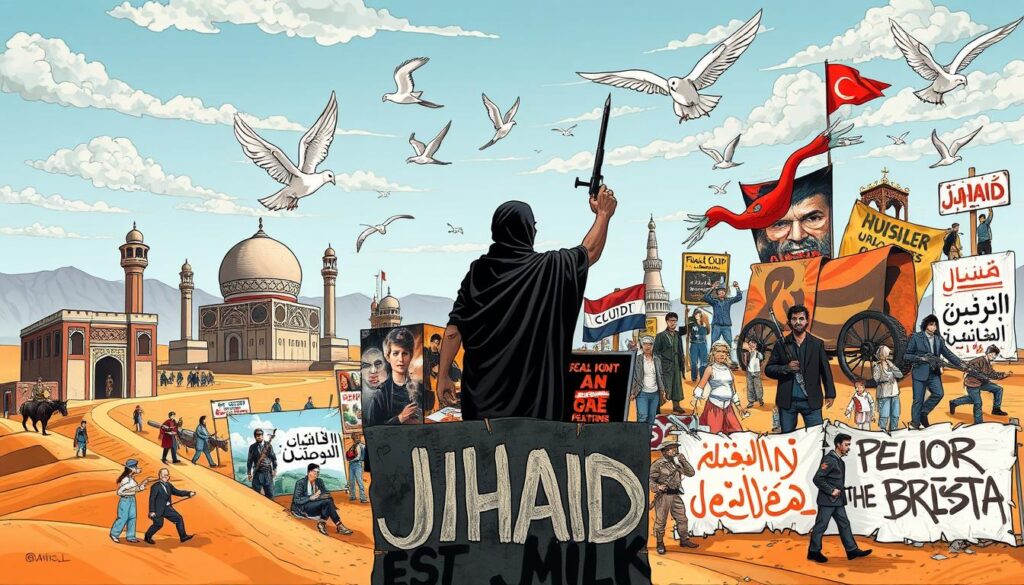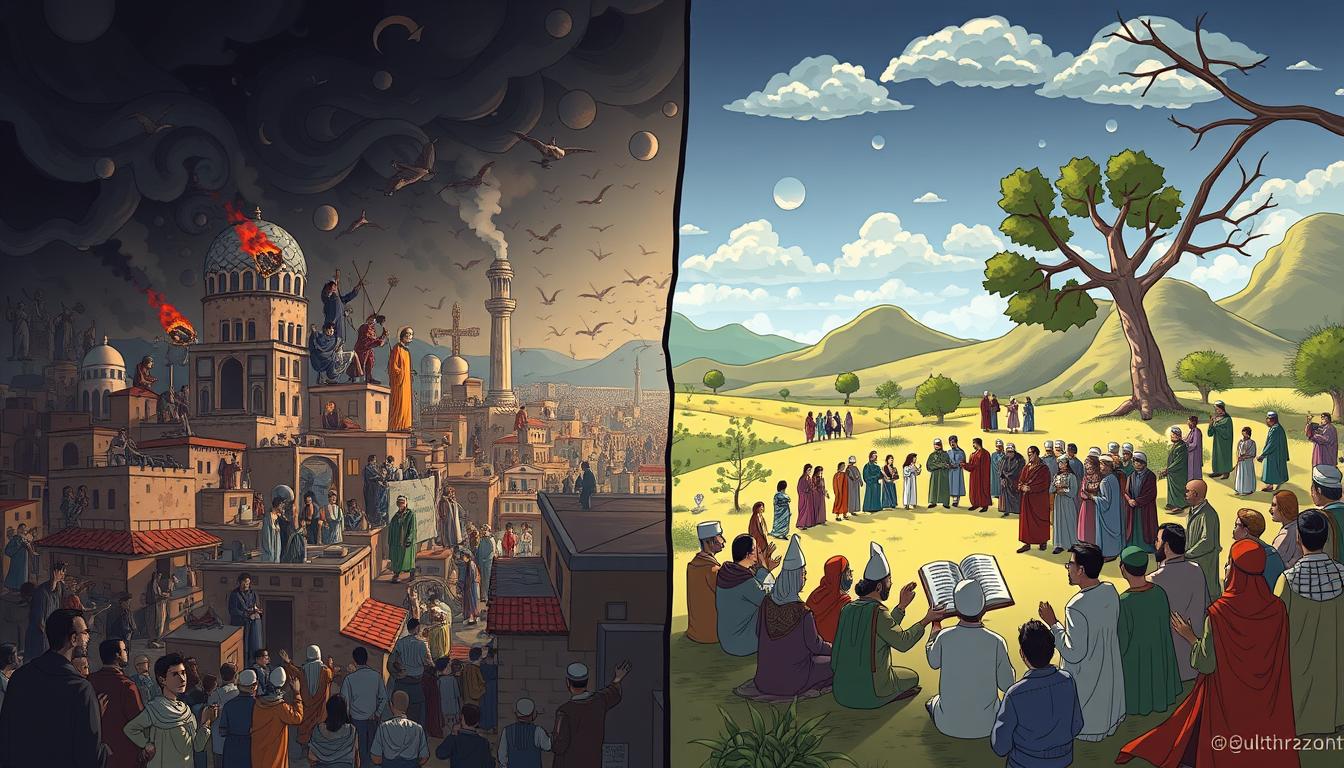The term “Jihad” often leads to heated discussions and confusion. A lot of the time, this happens because people don’t fully understand what it means. In Arabic, jihad means “struggle” or “effort,” showing it is a key part of Islam. But, many think of jihad as a “holy war,” which has caused many wrong ideas about it.
As Umar Khan Charity Organization, we aim to explain what jihad really means. We want everyone to understand its true sense from the Islamic viewpoint. Going through this will help clear up many wrong beliefs. It shows how jihad is actually about promoting peace, fairness, and personal betterment in those who want to aid others.
Key Takeaways
- Jihad means struggle or effort, not merely a call to arms.
- The concept is often misrepresented in the media, leading to widespread misconceptions.
- The Quran emphasizes the reactive nature of combat, affirming justice and defense.
- Extremists exploit Quranic verses out of context for their recruitment purposes.
- Understanding jihad requires a collaborative educational approach.
- Promoting awareness is key to combating stereotyping and prejudiced narratives.
The Definition of Jihad in Islam
Jihad is very important in Islamic teachings, touching on personal goals and community roles. It’s crucial to know what jihad definition truly means to understand its many aspects. These go beyond just fighting.
Linguistic Meaning of Jihad
The word “jihad” in Arabic means a struggle or hard work. This linguistic meaning is about Muslims trying hard to achieve goodness. They work on improving themselves and standing up against wrongs.
Types of Jihad: Greater vs. Lesser
There are two main kinds of jihad: greater jihad and lesser jihad. Greater jihad is the fight against one’s flaws and wrong desires. On the other hand, lesser jihad is about protecting the Islamic community when needed. Understanding this helps stop the wrong idea that jihad is only about violence.
Cultural Interpretations of Jihad
How people see jihad changes a lot around the world. Some focus on its spiritual side and personal duties. But sadly, some use the term for political gains or violence, missing the real message of kindness and fairness in Islam. Knowing about these different views makes the idea of jihad clearer.
| Type of Jihad | Definition | Focus Area |
|---|---|---|
| Greater Jihad | Struggle against one’s ego and moral weaknesses | Personal Growth |
| Lesser Jihad | Physical struggle for the defense of the Islamic community | Community Defense |
Historical Context of Jihad
Jihad’s history gives us insights into its importance in Islam. Its early stages were influenced by Prophet Muhammad’s life and teachings. He taught the importance of justice and defending oneself. Early on, jihad wasn’t just about fighting; it also had spiritual and moral sides.
Origins in Early Islamic History
Jihad in early Islam was both a spiritual and physical struggle. It aimed to bring justice and protect Muslims from oppression. The Quran teaches that fighting is allowed to defend rights. The death of Hussein at Karbala in 680 AD deeply impacted Shi’i Muslims. It showed the fight for justice and against tyranny. This event shaped how Shi’i Muslims see jihad and its rightful practice.
Jihad in the Crusades
The Crusades were key to understanding jihad, as Muslims united against foreign invaders. These events showed how Islamic and Christian societies interacted. Muslim leaders motivated their followers using early Islamic teachings. Their response demonstrated their community’s spirit and desire to protect their faith and lands.
Modern Interpretations Through History
By the 19th century, views on jihad began to change due to colonial pressures and Western interventions. These changes led to some extreme views, especially among jihadist groups that twisted jihad’s real meanings. This has caused many misunderstandings about jihad. It shows why it’s crucial to educate people about it. Considering Islam’s global community, which includes over a billion people, these discussions need careful and thoughtful approaches.

| Period | Key Events | Impact |
|---|---|---|
| Early Islam | Teachings of the Prophet Muhammad | Foundation for justice and community defense |
| Karbala (680 AD) | Martyrdom of Hussein | Formative event for Shi’i identity; justice prototype |
| Crusades | Jihad as a rallying cry | Complex interactions between Islamic and Christian societies |
| 19th Century Onwards | Colonial influences | Emergence of modern interpretations, need for education |
Misconceptions About Jihad
People think of jihad in many ways, often getting it wrong. We need to clear up these wrong ideas to truly understand jihad. One big mistake is thinking jihad means it’s okay to be violent. This view misses Islam’s real message, which is about peace and protecting oneself, not attacking others.
Jihad as Justification for Violence
Some link jihad to violence, ignoring what the Quran really says about fighting. Revealed over 1,400 years ago, the Quran allows fighting only if you’re being attacked or oppressed. This can be seen in verses like Quran [2:190] and [22:39]. The real focus of jihad is on non-violence. It encourages fighting for fairness and respecting others.
Jihad and Terrorism: A False Equivalence
Saying jihad is the same as terrorism is wrong and hurts Islam’s true message. Sometimes, extremists wrongly call their acts of violence jihad. This makes people scared and confused. Islam actually teaches kindness and peace. When jihad is misunderstood in this way, it harms and unfairly judges people in different communities. It messes up how the world sees Muslims.
The Media’s Role in Shaping Perceptions
The media is key in shaping how we see jihad and Islam. Often, it shows jihad in a negative light, focusing on violence. If the media shows jihad more truthfully, it can break down bad stereotypes. This starts real conversations about understanding. Working together, religious leaders, communities, and media can change the fear and wrong ideas people have.
Jihad in the Quran
The Quran is key to understanding jihad, with many verses that show its deep importance. These verses show jihad is more than conflict. They highlight moral behavior and the fight for justice.
Key Verses Related to Jihad
About 41 verses in the Quran talk about jihad. They cover a lot, from spiritual battles to fighting injustice. Jihad is about trying hard and following God’s path. While some verses talk about actual fighting, many discuss improving oneself and staying morally upright.
Contextual Analysis of Jihad Verses
Looking at the context of jihad verses helps us understand what they really mean. Most were revealed during specific events that influenced their messages. For instance, verses from Medina often talk about self-defense, not starting fights. This shows the complexity of interpreting the Quran and jihad today.
Interpretation by Scholars
For years, scholars have interpreted jihad in various ways, often highlighting its spiritual side. Today, many suggest looking at it in a new light. They push for understanding jihad as a way to achieve peace and fairness, not as a means of conflict.

The way we talk about jihad is changing. Studying Islamic teachings helps clear up wrong ideas. It shows why scholarly insight is key to grasping jihad’s role in promoting peace and living together. To learn more about Islam’s teachings on being kind and compassionate, read this article.
The Spiritual Aspect of Jihad
When we think about jihad, it’s about more than just conflicts. It’s about our journey to become better and grow spiritually. By understanding this, we can aim for greater things in our faith and community.
Personal Struggle for Self-Improvement
Spiritual jihad is about fighting our inner negatives. We’re pushed to improve ourselves and stay morally strong. This process is key to our growth and connection to our spirituality.
Jihad as a Path to Spiritual Growth
Dealing with inner and outer jihad leads to deep spiritual growth. Islam sees self-mastery as a great win. By diving into our faith and living right, we grow spiritually and help our community.
Community and Social Justice Components
Jihad also means working together for community and justice. We strive to help others, fight inequality, and support those in need. These efforts help us make a real difference in the world.
| Aspect of Jihad | Focus | Outcome |
|---|---|---|
| Personal Struggle | Self-improvement | Moral integrity and self-discipline |
| Spiritual Growth | Understanding faith | Authentic connection and mastery |
| Community Action | Social justice | Equality and welfare |
Contemporary Views on Jihad
Today, the conversation about jihad has changed a lot in the modern Muslim world. Many see jihad as more than just conflict. It’s now seen as a call to support social justice and humanitarian work. This new view highlights helping the community, giving to charity, and living peacefully together.
Jihad in the Modern Muslim World
In the modern Muslim world, jihad promotes unity and action. Muslims use this idea to start projects that solve social problems. It’s all about lifting up the community with actions that reflect Islamic beliefs. This change helps us deal with the mix of faith and today’s issues.
Diverse Perspectives Across Different Cultures
Different cultures see jihad in unique ways. Understanding these views helps us appreciate the variety within Muslim practices and beliefs. Looking at these differences, we learn that jihad has many meanings. This helps us find common values.
Grassroots Movements and Jihad
At the grassroots level, our view of jihad is changing. These movements focus on peace, justice, and making communities better. They match the goals of the Umar Khan Charity Organization. Our work in faith-based humanitarian efforts shows how we can tackle today’s issues together.
| Perspective | Focus Areas |
|---|---|
| Modern Muslim World | Social justice, community service, humanitarian efforts |
| Cultural Perspectives | Diverse interpretations, rich appreciation of practices |
| Grassroots Movements | Peace initiatives, justice, community empowerment |
Jihad and Islamic Law
The link between jihad and Islamic law, called Sharia, is complex. To understand it, we need to look at how Sharia views jihad. We also need to understand the duties and rights that come with it. There are ongoing debates among scholars that help shape how we see jihad today.
The Sharia Perspective on Jihad
Sharia gives clear rules about jihad. It tells us that jihad is mainly for defense. It also says we must act ethically, especially in war and when solving conflicts. According to Islamic law, jihad actions must be just and kind. They must respect the value of life.
Rights and Responsibilities in Jihad
In jihad, rights and duties are very important. Muslims must start jihad with good intentions. Their aim should be to protect innocent people and make sure justice wins. Using jihad in the wrong way goes against Islam’s main teachings. It harms the religion’s ethical basis.
Debates Among Islamic Scholars
There are always discussions about jihad among Islamic scholars. They look at how jihad fits into today’s world. These debates are important. They help us understand how old teachings can match today’s ethical standards. Talking about this helps make the real meaning of jihad clear. It also corrects wrong ideas, especially those linked to extreme acts that don’t show what jihad and Islamic law truly stand for.
Jihad in Popular Culture
Looking at jihad in popular culture shows us it’s often seen in a simplified, exciting way. Films and media usually focus on the fighting side, missing the ethical and spiritual parts of jihad in Islam. This limited view adds to the big misunderstandings about this important idea.
Representation in Film and Media
Films often show jihad in a negative light, making stereotypes stronger. They focus on violence, leaving out the real meanings of struggle and self-betterment. This way of showing it makes people misunderstand jihad’s role in Islamic teachings.
Literature and Jihad: Misunderstandings
Jihad is misunderstood in literature, too. Many stories don’t cover its full meaning. This leads to wrong ideas about Islam and its messages. A more balanced look in books could help people understand and respect the different views of jihad.
Impact of Stereotypes on Public Perception
Stereotypes about jihad affect how people see Islam. Pop culture creates simple stories from a complex belief system. This makes people confused and wrong about jihad’s principles. Fighting these stereotypes is important for better understanding and peace between jihad and Islam.

Moving Beyond Misconceptions
We have a key role in clearing up wrong ideas about Islam and the true meaning of jihad. This helps us build respect and deep talks. By talking openly, we can overcome false beliefs and make our community stronger.
Our work at the Umar Khan Charity Organization focuses on bringing people together. We want everyone to understand each other better and work as a team.
Promoting Understanding and Dialogue
Educating people can change how they see jihad and Islamic beliefs. Giving out the right facts not only changes stories but also makes a place where everyone feels included. When mistakes are fixed, everyone gets along better.
As followers of Islam, we must spread truths about our faith’s kindness and fairness. This will keep conversations about important issues going.
The Role of Education in Clearing Misunderstandings
We should tell positive stories about Islam to highlight its peace, fairness, and how it helps communities. The Umar Khan Charity Organization shares such stories, showing the care found in Islam. This way, we fight against negative images and motivate others to see the beauty in our beliefs.






